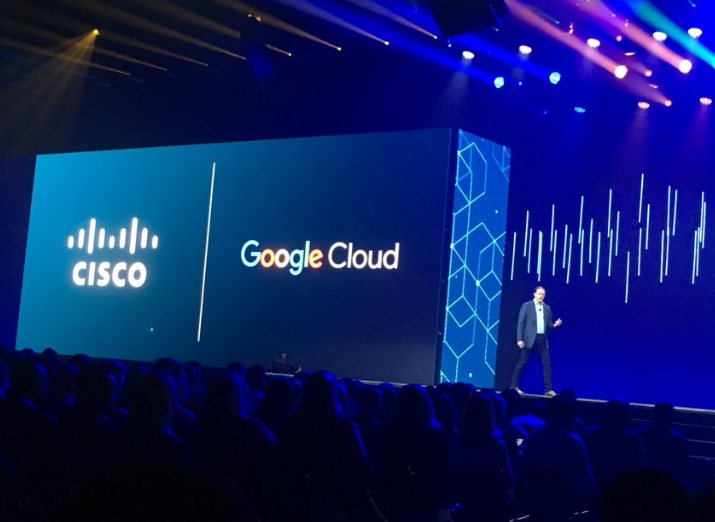 CLOUD
CLOUD
 CLOUD
CLOUD
 CLOUD
CLOUD
Cisco Systems Inc. and Google Inc. Monday revealed more details about a planned hybrid cloud offering designed to help customers build apps that span on-premises data centers and the public cloud.
The companies announced the Cisco Hybrid Cloud Platform for Google Cloud last year. At the time, they said the offering was designed to let companies run their applications in a hybrid computing environment, in which some jobs are run on-premises while others are offloaded to the cloud.
During his keynote at the Cisco Live! event in Orlando Monday, Cisco Chief Executive Officer Chuck Robbins (pictured) welcomed Google Cloud CEO Diane Greene onstage to discuss the project. The executives promised a tenfold productivity improvement with the platform, which is to be made generally available to customers later this year.
Cisco Hybrid Cloud Platform for Google Cloud works by running containerized applications between Cisco-powered data centers and the Google Cloud Platform via Kubernetes and Istio. Kubernetes is used to manage containers in the cloud, while Istio is used to connect, manage and secure the microservices used to build containerized apps.
At the time of the original announcement, Wikibon senior analyst Stu Miniman told SiliconANGLE that these two key technologies could make all the difference.
“Orchestration and service mesh services are strong fit for coordination with networking in a multicloud world,” Miniman said. “Customers are in need of partners that can help them span across many environments and have consistency of data management and security.”
The partnership has the potential to become instrumental for both companies. Google has for years been fighting to make its cloud more relevant to enterprises that generally see rival clouds such as Amazon Web Services or Microsoft Azure as a better fit for their needs. Cisco, which is ubiquitous in the enterprise information technology world, can provide Google with much better access to this market.
Cisco would also benefit from a successful partnership, because it’s striving to transform itself from a company dependent on hardware sales to one whose growth is driven by software and services. Currently more than half of Cisco’s revenue comes from hardware sales, but its software revenues are growing fast thanks in part to existing partnerships with Google’s rivals AWS and and Microsoft.
“Cisco is looking to positioning itself as a critical component of the multicloud world,” Miniman added. “Networking and security are needed more than ever, so Cisco has a good reason to push into this space.”
During their keynote, Robbins and Greene said the offering will combine Cisco’s new Container Platform, based on Kubernetes and launched earlier this year, with a hyperconverged infrastructure product known as HyperFlex, and will be tightly integrated with Google Cloud.
“Whether you use their cloud for Kubernetes, or Cisco Kubernetes on prem, you get the same experience,” Robbins said of the partnership.
Meanwhile, Greene spoke about the value of Kubernetes for developers, saying it makes them more productive because they can build their applications without worrying about the infrastructure. She also said IT environments will be easier to manage because they’ll be uniform no matter where the applications are run. Cisco’s engineers will provide support for the platform, Google said in its blog post on the update.
The partnership between Cisco and Google should warrant some serious attention from enterprises that are in the midst of their digital transformation as they evaluate ways to move their applications to the cloud, Holger Mueller, principal analyst and vice president of Constellation Research Inc., told SiliconANGLE. He explained that what Cisco and Google are doing beyond “pure vanilla Kubernetes” is important because it means they can offer extra value to enterprises.
“Cisco needs a cloud outlet and Google wants hybrid load, so there’s no surprise here,” Mueller said. “Corporate executives who are building next-generation applications will pay attention to the value here and measure the difference between doing this themselves in-house.”
Cisco and Google will still face a tough time in convincing enterprises to use the new offering, however, since they face strong opposition in the hybrid cloud business. AWS for one, has its own partnership with VMware Inc., while Microsoft Azure provides a strong hybrid-cloud platform of its own. Other rivals, including IBM Corp. and Oracle Corp., are also pushing their own hybrid-cloud plays.
Support our mission to keep content open and free by engaging with theCUBE community. Join theCUBE’s Alumni Trust Network, where technology leaders connect, share intelligence and create opportunities.
Founded by tech visionaries John Furrier and Dave Vellante, SiliconANGLE Media has built a dynamic ecosystem of industry-leading digital media brands that reach 15+ million elite tech professionals. Our new proprietary theCUBE AI Video Cloud is breaking ground in audience interaction, leveraging theCUBEai.com neural network to help technology companies make data-driven decisions and stay at the forefront of industry conversations.